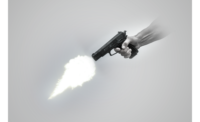According to a recent report from Omnilert, there have been more than 600 mass shooting events each year for the past three years. In response to this — and other gun related incidents — the security industry has been turning to gun and gunshot detection offered by companies like Omnilert, Shooter Detection Systems and Active Intelligence. SDM spoke with experts from those companies about the technology — powered by artificial intelligence — and the opportunities it offers to security dealers and integrators.
SDM: Which market segments are currently showing the biggest demand of gun detection systems?
GUSTAVSSON: Security professionals everywhere are looking for new layers of protection from gun violence across industries including K-12, higher education, healthcare, federal, state and local government, retail and commercial, finance and banking, and hospitality.
BRUNET: The education sector, both K-12 schools and higher education, is a growth area for us, and we’re now in a position to help schools and other nonprofits fund the system through our nationwide SecureGrants program. Our grants team consults with the customer and provides end-to-end support throughout the process. They match our customer with the most competitive grant opportunities available from federal, state, and other funding resources, and fully support them through the application writing and the funding distribution process.
In the commercial sectors, transportation hubs like airports and ports were some of our earliest adopters and we are actively expanding this part of our customer base. We are also seeing demand coming from smaller commercial businesses. They are interested in the benefits and value provided by gun violence solutions that work alongside their video and access control systems. These customers might be less concerned with a mass shooting but are looking for solutions to receive an alert to gunshots being fired on their property — for example if gunshots are fired in a cash grab situation. We are working closely with Alarm.com to release a unified solution to their service providers for customers on the Alarm.com platform.
LAMARCA: Since ASTRA learns what is considered normal activity for each installation and unique camera view, it can detect anomalies in virtually every vertical market and application. ASTRA is truly vertical market agnostic because it does not require any rules and is therefore at home in most applications. We are currently finding promise and demand in the healthcare, family entertainment and municipal markets. ASTRA’s anomaly detection serves these environments particularly well, supplementing operator monitoring of highly detailed and busy spaces.
SDM: Are security dealers and systems integrators a good reseller for gun detection systems?
BRUNET: All types of customers are actively seeking gun violence solutions, and now is the time for security dealers and integrators to bring gunshot detection into their portfolio to meet this demand. SDS only sells its products through authorized dealers. SDS has always believed that security dealers can best assess their customer’s security needs and take a holistic approach to developing a portfolio of technologies and services designed to meet the customer’s specific requirements. As SDS’ products are frequently installed with VMS, access control or mass notification products, having a dealer who can integrate all these powerful technologies can elevate the value that SDS has in the marketplace.
GUSTAVSSON: Security system integrators are an integral piece in bringing gun detection systems to market, which is why this community has been a focus for Omnilert the past two years. Omnilert is known for being a reseller friendly partner because we recognize the central and trusted role they play in connecting their customers with the right technology solutions that work for their needs and with their existing security programs.
LAMARCA: We chose to promote and market ASTRA through the integrator channel because of their experience, expertise and excellent relationships with strategic end-user customers. The integration companies we partner with are seen as subject matter experts and trusted advisors. They have unique insight into their client’s challenges and are best suited to recommend appropriate solutions. We are highly selective about the companies that we authorize to sell ASTRA in order to ensure a positive customer experience. Additionally, we fully support our integration partners, as we do not sell ASTRA directly to end users.

SDM: How have your gunshot and gun detection solutions been improved over the past 12 months? What is new and different, and what are the advantages?
LAMARCA: ASTRA continues to evolve and improve. Over the past 12 months we have been able to further enhance detection capabilities and processing speeds by leveraging new GPU improvements offered by our technology partners, maximize hardware efficiencies and build out robust integrations with leading VMS manufacturers. These improvements ensure that ASTRA performs seamlessly across diverse vertical markets.
BRUNET: In early 2023, SDS launched a new feature called ResponderLink. SDS core features have always included customer alerts that include location of shots fired in the building, but now customers can choose to make their sensor data available to first responders. Through an integration with Noonlight, an Alarm.com company, ResponderLink is an embedded software feature that automatically sends a customer’s gunshot sensor data to a 24/7 call center.
A trained safety agent then notifies emergency services (911 PSAP) and shares the customer’s gunshot data in real time via a live URL dashboard, powered by Noonlight’s SendPolice platform. This dashboard also opens a group SMS chat that includes the customer, the 911 dispatcher, and the Noonlight representative so real-time communication can be happening in tandem with the incident information flowing into the dashboard from the SDS system. This feature allows first responders (police, ambulance, etc.) to have the most up to date information as the crisis unfolds.
GUSTAVSSON: Omnilert’s AI is constantly learning and getting smarter with real-world data from hundreds of deployments across industries and throughout the country. These shared improvements benefit all Omnilert customers through regular automated updates while we also provide site-specific training to further improve performance. Omnilert Gun Detect can visually detect a weapon in less than a second and once verified automatically initiate a robust response designed to save lives such as notifying police, locking doors, sounding alarms, sending alerts and more.
Omnilert off-the-shelf integrations doubled in 2023, covering video management, emergency mass notification, access control, control room and real-time crime center platforms and other communication systems. This increase in software integrations underscores Omnilert’s commitment to being an open platform, enabling innovations by partners through open APIs and dedicated integration support. Our strong integration support makes it easier for our systems integrators to bring full solutions to their customers as we can work with other complimentary software and hardware to activate response plans and lockdowns after gun detections are confirmed.
SDM: What advanced technology is used in your company’s gun detection products/systems, and how do they function?
BRUNET: SDS developed its product to be the industry leader in both detection accuracy and lowest false alert rate. SDS’ sensors use dual-factor verification to detect and verify firearm activity. Algorithms inside the sensor evaluate the two main physical signals from a discharged firearm: acoustic (the bang or noise) and infrared (the heat/light flash from the muzzle). Algorithms inside the sensor evaluate the different characteristics of each signal to ensure the highest level of accuracy.
GUSTAVSSON: Omnilert Gun Detect visual gun detection system includes an AI software that is specifically designed and 100 percent focused on fast and reliable firearm recognition. The Gun Detect system is a highly scalable real-time platform leveraging a proven emergency communications infrastructure, which has been managing billions of events for thousands of customers over more than a decade. The advantage of this platform is its ability to activate a programmed response, which includes integration with many other safety systems as well as broadcasting alerts to first responders and impacted people. These alerts can be broadcast concurrently through multiple channels, including Omnilert’s mobile applications, desktop, web and third-party safety systems.
LAMARCA: At the heart of ASTRA’s Anomaly Detection are three core technologies — AI, machine learning (ML) and complex neural networks (CNN). Each of these rely on leading-edge AI platforms, along with our proprietary code, to allow ASTRA to rapidly and efficiently analyze incoming video for anomalous events — without the need for rules. The machine learning model helps ASTRA to understand what would be considered normal in the scenes, while AI allows ASTRA to identify anomalies which trigger operator alerts through the VMS and initiate standard operating procedures.

Active Intelligence
The ASTRA Anomalous Detection Solution identifies an all-inclusive range of anomalies such as a person lying on the ground, physical violence, fire and smoke, pedestrians walking in front of moving vehicles, thefts, vandalism, traffic jams, weapons and more.
IMAGE COURTESY OF ASTRA

Omnilert
Omnilert Gun Detect aims to save lives through early gun and active shooter detection, human verification, mass communication and automated response. Its AI-powered visual Gun Detect Software leverages existing security cameras to create a widely deployable early gun detection solution. In fractions of a second, Omnilert’s AI identifies a gun threat and sends an alert for human verification.
IMAGE COURTESY OF OMNILERT

SDS
SDS Indoor Gunshot Detection features a patented dual-mode sensor technology and robust software to help make the most informed and timely decisions. SDS can detect shots fired, offers acoustic and infrared validation and sends alerts while also mapping the location of the shots fired.
IMAGE COURTESY OF SDS
SDM: Specifically, how do your products address false positives?
GUSTAVSSON: Omnilert Gun Detect’s standard model, while highly accurate at over 99.999 percent, has been designed to learn our customer’s environment and automatically through regular updates further improve accuracy and lower the rate of potential false positives, while always ensuring to positively identify brandished firearms. Additionally, Omnilert has three monitoring centers across the country with industry professionals that provide customers with human verification of gun detections, shielding customers from possible false positives. Omnilert also provides a video snippet with its detection alerts, which is a critical piece of intelligence to determine if a detection may be real or not.
BRUNET: By using two-factor verification, SDS significantly reduces the possibility of a false alert. Products that only look for the acoustic signature of a firearm or only partially rely on multimodal detection are prone to higher false alert rates to other loud noises in the environment, for example a locker slamming in a school hallway or a pallet drop in a warehouse.
LAMARCA: ASTRA produces a minimal number of false positives — a statistical anomaly either exists or does not. However, anomalies that do not require action may trigger an alert. Future updates to the platform will allow operators to interact with ASTRA to identify and label these anomalies, honing ASTRA’s model further. The platform also looks for frame loss in video streams to ensure that these errors don’t trigger anomalies, and subsequent alerts, for the operator.
SDM: What information does your gun detection product/system provide about an incident?
GUSTAVSSON: Monitoring centers and security professionals receive an annotated full field of view still image of the detection frame; an annotated close-up magnification of the suspected firearm and who was brandishing it; event metadata including time, camera name, description and location; as well as a video snippet for additional context to determine the appropriate response and escalation. More metadata is available via our robust and open Alert, Verification and Alarm APIs.
Threats are confirmed with a simple touch or click of a button. Additionally, response plans and other integrations can be activated in just a tap or click to include calling police and alerting Real Time Crime Center dashboards, locking doors, sounding alarms and notifying those in harm’s way via a customer’s existing Emergency Mass Notification System (EMNS) or use of Omnilert’s proven and award winning EMNS. Throughout the duration of an incident, the system continues to provide staff and first responders with continual situation intelligence on the location of the detected gun.
LAMARCA: ASTRA has the ability to identify most anomalies — it is not limited to any one type. Notifications include the time and date, camera ID, a video frame with a hotspot indicating the location of the anomaly, and accompanying video, as the event is unfolding, for further investigation. The tight integrations with VMS platforms allow standard operating procedures to be triggered, depending on where and when an anomaly takes place. Future updates to the platform will allow it to identify specific actions and types of anomalies utilizing AI-based auto classification.
BRUNET: During a crisis, users can only process basic levels of information. For this reason, SDS provides only the most critical pieces of information while the crisis is unfolding. In addition to a visual overview of sensor activity in a building — delivered via a desktop software utilizing building floor plans showing sensor locations — the SDS system also sends designated users SMS and email alerts containing the facility name, building name, location name, floor name and date and time data.
Names are predefined by the user so they can easily recognize the area being impacted. Each shot is both visually displayed on the desktop software and triggers an SMS/email alert. Users of the desktop software can see the path that the assailant is taking as they move across floors or change buildings. For customers who utilize the ResponderLink feature, all sensor data is collected on an online dashboard for both the customer and 911 operators to see. This includes building location map, address and contact information, real-time sensor data and live chat capabilities.

SDM: What features do your gun detection products have that make them integrator/installer-friendly?
BRUNET: While SDS offers over 50 manufacturer-certified integrations with leading VMS, access control and mass notification providers, the SDS Indoor Gunshot Detection system can be easily integrated using just a simple dry contact relay. The SDS Software, used to monitor and communicate the sensor outputs, can be easily installed on a wide range of server configurations. For buildings where cable installation may be an issue, SDS offers a wireless version of its sensor.
SDS has a full library of training and technical materials to help integrators deliver a high level of service. We also have a patented handheld tester that integrators can use to test and inspect the system. Similar to fire alarm testing, the SDS tester does not create any noise and can be used during normal business hours to test sensor health. Technicians then receive a status report on their phones, so it is very easy to use. Customers are asking for gunshot detection solutions and the SDS program provides integrators with an additional stream of income not only in hardware sales, but in service contracts.
LAMARCA: Setting up ASTRA is extremely easy — with no rules to configure, integrators simply need to set up the server, install ASTRA, and allow it to learn over a period of two weeks. ASTRA’s hands-off installer package makes initial set up simple for integrators, and a web GUI is included to allow for easy and simple server-side configuration and presentation of important data. What’s more, if a camera requires removal or replacement, no additional configuration is necessary.
The solution was designed from the outset to be a fully integrated solution. ASTRA functions from within the existing VMS platform, which means there are no new interfaces to set up or learn. This seamless integration also allows for easy and simple end user training by the integrator.
GUSTAVSSON: Omnilert allows any given server to support a large number of camera streams. Its system flexibility allows for many different camera types to be used to give the reseller an opportunity to work with existing systems but show the value of upgrading cameras over time to further improve performance.
An Omnilert-introduced appliance provides a simplified out-of-box experience, so that systems will provision themselves automatically and can be centrally setup, managed and optimized. Omnilert’s broad integrations with other safety systems and platforms ensures that Omnilert Gun Detect can be used alongside systems the reseller is familiar with and can show increased value for. It also features an open platform with APIs and an integration program to allow resellers to build custom or enhanced integrations with their customers’ systems — for alerting, verification and alarming.
And it has a high value recurring revenue stream due to the SaaS nature of the Gun Detect system.













